12 Proven Tips for Selling a Home with a Pool Fast
Imagine going out into your garden and seeing water that is as clear as glass. The sun is dancing on it, and it makes you want to start a life of lazy afternoons, lively pool parties, and refreshing morning swims. A pool isn’t just a convenience for many buyers; it’s a promise of a way of life and a place to make memories.
Now, if you’re trying to sell a house with a pool, you might be wondering: Does having a pool increase home value? Is it harder to sell a house with a pool? The truth is in the plan. If you follow your plan correctly, you can raise your sale price by 7–15% and attract buyers like bees to honey. If you make a mistake, you might end up stuck in a market that isn’t moving.
This detailed guide gives you a plan for selling a home with a pool. It uses the best advice from top real estate agents in states with lots of pools, like Florida, Texas, Arizona, and California, as well as facts from industry studies and real seller stories.
No matter if you live in a sunny suburb or a cold town in the Midwest, these 12 tips will make your house with pool an appealing gem. We’ll talk about getting ready, staging, marketing, and how to deal with buyer complaints so that your pool isn’t just a feature, but the showpiece. Are you prepared to make a pool selling splash? Let’s bounce right in!
Table of Contents
How to Sell a House with a Pool: Two Sides to the Story
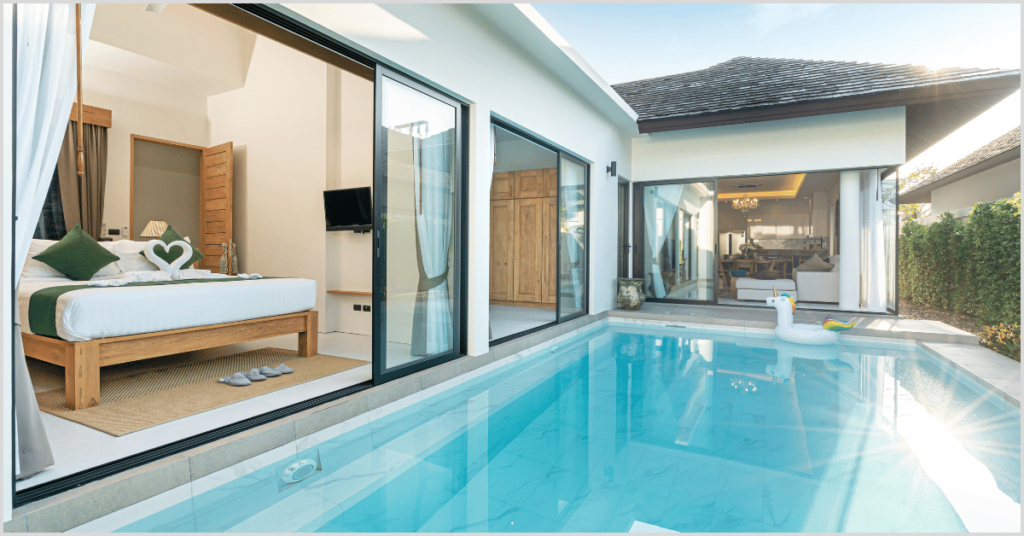
Based on how you play your cards, a pool can either make or break a deal. In hot places, like Miami, where 60% of homes over $1 million have pools (local MLS data), it’s often a must-have. In those areas, buyers see a house with pool as a private getaway.
This will increase demand and drive up costs, adding $30,000 to $100,000 to the sale charge in high-end neighborhoods. But in cooler places or if the pool isn’t taken care of, it could be a liability—buyers worry about the $1,000 to $5,000 a year maintenance costs or the safety risks for kids (the CDC says drowning is the leading cause of death for kids ages 1 to 4).
How to get people to buy a house with a pool? Prepare very well, know your market, and sell the way of life, not just the water. It’s not enough to hope people “get it”; you need to show them why they need it. A Scottsdale seller said that their updated pool with a spa and waterfall caused a bidding war and sold for $75,000 more than they had asked for.
At the same time, a homeowner in the Midwest found out the hard way that a cloudy, cracked pool turned families away and cost them weeks on the market. Let’s talk about what you can do to improve your chances.
Does Having a Pool Make a House Worth More?
Before we get to the tips, let’s answer the most important question: Will a pool increase home value? The answer is “maybe”—it depends on where it is, how good it is, and what the buyer wants. The National Association of Realtors says that in-ground pools can raise the value of a home by 5 to 7 percent, which is about $15,000 to $35,000 for a $500,000 home.
That number can go up to 10-15% in places like Florida and California that allow pools. Redfin data shows that homes with pools usually sell for $95,000 more in Los Angeles, but the price difference is between $18,000 and $50,000 in Texas. In colder places, like Ohio or Massachusetts, the boost might only be $5,000 to $15,000, at most. Pools above ground? They don’t do much and can even turn people off from buying because they’re often seen as temporary eyesores.
What Decides If a Pool Makes a House More Valuable?
- Location and Weather: Pools are a must in places with lots of sunshine, like Arizona or Florida. In the Northeast, they’re harder to sell because they cost $200 to $500 a year to protect against cold.
- Condition and Age of the Pool: A beautiful, energy-efficient pool that is less than 10 years old can fetch a lot of money. A treasure that is cracked and prone to algae growth could lose $5,000 to $10,000 in value.
- Buyer Profile: Pools are great for families with teens, young workers, and entertainers. Many people who are retired or have young children pass because they are worried about safety or care.
One Arizona seller said that replacing the plaster and adding LED lights to their pool for $10,000 raised the price by $40,000. Another person in Ohio had an old pool that appraisers didn’t even look at, so they only added $5,000, even though the pool cost $50,000 to build. What did you learn? A better way to invest and market. You can get a higher price if you get a pre-listing evaluation that focuses on your pool.
How Hard Is It to Sell a House with a Pool?
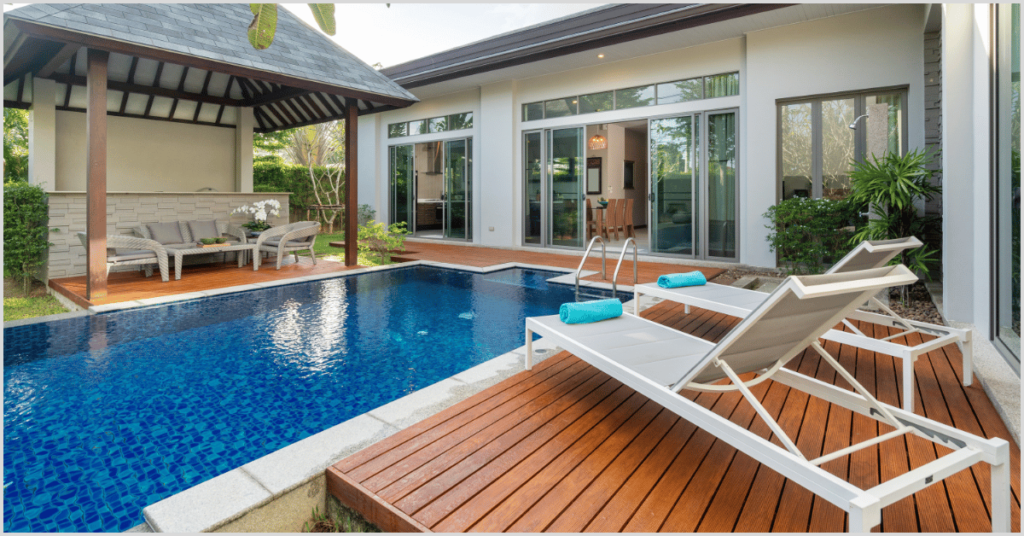
If you search for is it harder to sell a house with a pool, you’ll find some terrible stories: “Buyers hate the care!” “It makes your community smaller!” Some of what you say is true, but it’s not the whole story.
From what I’ve heard from sellers and agents, the real problem isn’t the pool; it’s that their standards aren’t being met. Let’s bust the myths and change the way the story is told.
- Myth #1: Pools scare off all families. The truth is that families with school-age children often look for pools for summer fun. According to HomeLight, 40% of buyers polled said “family entertainment” was one of the main reasons they wanted to buy. But parents of babies worry that their kids might drown. To fight this, show off safety features like walls and alarms.
- Myth #2: The Cost of Upkeep Stops Deals. Pro services can cost between $1,000 and $5,000 a year, that’s true. A smart seller would say, “Here’s a year’s maintenance contract included.” This is what one seller I know did to close the deal in 10 days.
- Myth #3: Pools Make Sales Slower. Not always. According to Zillow, homes with pools sell 10–20% faster in the summer in places like Texas and Georgia that are good for pools. You don’t want your post to sit like a forgotten pool float, though.
Is it harder to sell a house with a pool? Only if you carry it around with you. If you think of it as an improvement to your way of life, you’ll be able to fish in a stocked pond. A Florida seller held an open house with a “pool preview” and offered mocktails and supervised swimming for kids. Within a week, they had a lot of bids.
12 Tips That Will Change How You Sell Your Home with a Pool
Tip 1: Get a Pre-Sale Pool Inspection to Avoid Surprises
You could lose the sale because of a secret leak or a broken pump. For $100 to $300, you can lease a certified pool inspector to search for cracks within the structure, leaks, or troubles with the equipment. Fix small issues early on, like $250 for a fitting restore or $500 for a filter out change, before buyers notice them. Remember to hold the papers because they show that you’re not selling a money pit.
Case Study: A Texas seller ignored a “small” crack, but the buyer saw it during the inspection and asked for a $12,000 discount. A $500 fix before the sale would have saved a lot of money.
Pre-Sale Pool Inspection Checklist.txt
Tip 2: Deep-Clean for a Great First Impression
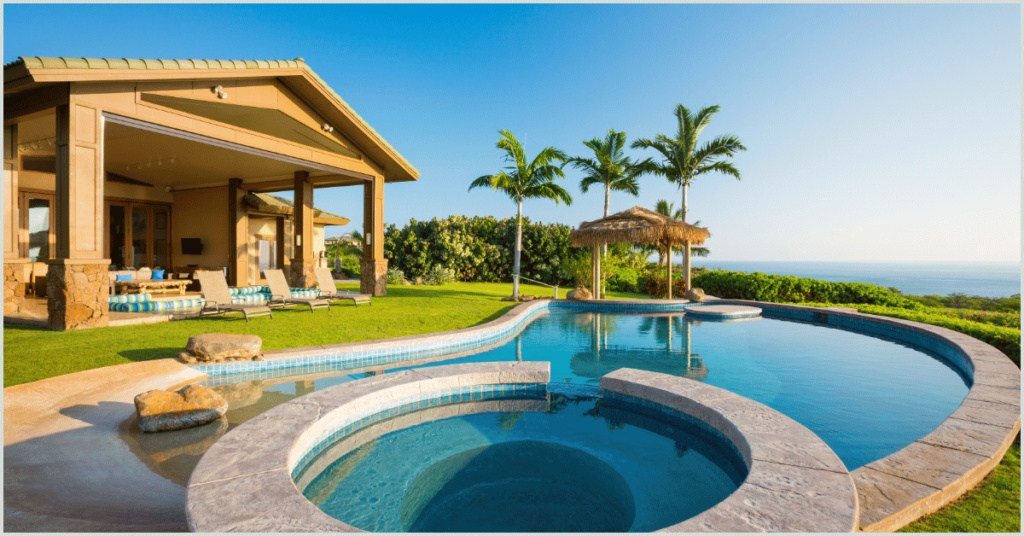
A cloudy pool says “neglect,” while a sparkling one says “luxury.” For $120 to $270, a professional cleaner will skim off dirt, hoover the bottom, and balance the chemicals.
Get paid $60 to $90 an hour for weekly maintenance work during showings. Buyers want a blank slate, not your child’s inflatable unicorn graveyard, so get rid of the deck tiles and toys.
Pro Tip: For $300 to $450, a chlorine wash can bring back life to stained walls and make an old pool look brand new. A seller’s $400 clean-up made an offer of $20,000 more.
Tip 3: Make Safety Features Stronger to Calm Buyers Down
For families with young children, safety is very important. The National Drowning Prevention Alliance says that putting up a four-sided fence with self-latching gates cuts the chance of drowning by 83%. For $200 to $400, you can add a net safety cover or pool alarms.
Check your local laws. For example, Massachusetts needs gates that can be locked, and Florida usually wants full enclosures. “Family-friendly oasis with top-notch safety” should be highlighted in the ads.
Seller Story: A couple in Florida put up a $1,500 fence around their home, and it sold in 10 days to parents who had been looking for a house without a pool.
Tip 4: Keep a Record of Maintenance History for Full Transparency
People want to see proof that you’ve taken good care of your pool. Put together a binder with service contracts, restore payments, and heater or pump warranties. Show the yearly charges ($960 to $1,800 for the basics, based on figures inside the industry) and draw attention to upgrades that save energy, such as variable-speed pumps that keep $1,500 a year. Arguments like “this will cost a fortune” can’t stand up to transparency.
Pro Tip: Give a six-month service contract that can be transferred for a fee of $700 to $1500. People will see it as a stress-free bonus. It only took 14 days for one seller’s contract to close a deal.
Tip 5: Set Up the Pool Area to Look Like a Resort Getaway
Turn your pool area into a living space. To make zones, you can buy chaise lounges for $300 to $500, a restaurant set for $200, and a fire pit for $150 for evening entertainment. Cost in total? $500 to $1,000 at Home Depot or Wayfair. Take down any personal things, like family photos and neon noodles, so that buyers can picture their summer parties. Photos of the twilight with LED lights? Just magic.
Example: A California seller spent $800 on setting (rented furniture and potted palms) and got a sale in 12 days for $30,000 more than they asked for.
Tip 6: Pools cape with Low-Maintenance Greenery
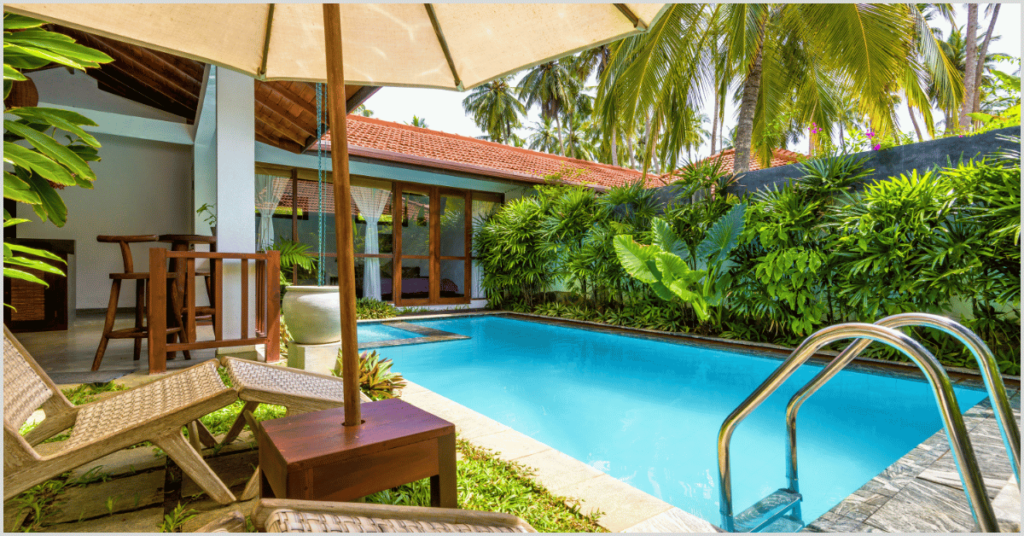
Plant rich, easy-to-care-for flowers across the pool, like ferns, banana bushes, or black-eyed Susan ($200 to $400). For an easy look, mulch the beds. People who are buying want a resort-style home, not a jungle. For $20 to $50 a picture, virtual staging tools let you try out looks online first.
Impact: According to the agent, a clean “pools cape” made one Georgia property seem worth $10,000 more. People who bought it loved the “tropical escape.”
Tip 7: Time Your Listing for Peak Pool Appeal
List year-round in warm places like Florida or Arizona, where there are 300 or more sunny days a year. In areas that have seasons, like the Midwest, you should aim for late spring to early summer. Listings for winter? Warm up the pool and take pictures of the steam. The data from Zillow shows that homes with pools sell 10–20% faster in the summer in swing states like North Carolina.
Success Story: A Texas home listed for Memorial Day got 15 showings in a week. Buyers loved the “ready-to-splash” vibe on hot days.
Tip 8: Highlight Energy-Efficient Features
Buyers fear that their energy bills will be very high. Install solar heaters ($1,790-$4,148, which cut bills in half), LED lights ($500), or variable-speed pumps ($1,000). Add utility logs that show how much you’ve saved. “Eco-friendly pool saves $1,500/year—relax without stressing your wallet” should be written in the ads.
ROI: A seller’s agent in California said that a sale of a house with a $2,000 pump update brought back $5,000. People loved the “green” angle.
Tip 9: Market the Lifestyle, Not Just the Pool
Don’t just say “in-ground pool.” Sell the dream: “Host epic summer barbecues in your private oasis.” Use $300–$500 drone shots to attract buyers from far away and virtual tours for those who can’t be there in person.
One agent’s experiment showed that having a “Poolside Preview” open house with iced tea and guided kid swims brings in 30% more people. Add search terms like “4-bedroom house for sale with pool” to your social posts to get people looking in your area.
Example: A drone video of a Florida listing went viral in the area and led to three offers in a week.
Tip 10: Get People to Buy by Giving Them Incentives
You can tip the scales with perks like a year of pool maintenance ($1,500 to $3,000 value), a $1,000 furniture allowance, or a $200 “pool school” lesson for first-timers. Many people say things like, “I’ve never owned a pool,” but a Texas seller’s $500 service credit got them a full-price offer in 18 days.
Idea: As a parting gift, think about bundling a safety cover. Buyers will love the thought, and it only costs $300 to $500.
Tip 11: Deal with Objections with Ready-Made Scripts
They will push back, so be ready with facts and understanding. People who say “maintenance costs too much” should be told, “Our logs show that this efficient pump costs $1,200/year; here’s my service guy’s number for a free quote.” People who say “safety worries” should be shown your fence and alarms and told, “These cut risks by 80%, according to safety experts.” Use these examples to turn fears into features.
Stat: A HomeLight study found that 70% of buyers change their minds about objections after seeing maintenance records.
Tip 12: Partner with a Pool-Savvy Agent

An area pro who has closed 10 or more pool deals is your MVP. They’ll know the ins and outs of the market. For example, I’ve heard that in Dallas, pools make high-end homes worth an extra $50,000 to $80,000.
They’ll set prices, let you know which repairs to skip, and sell to people who love pools. Find one with a good track record on sites like FastExpert or HomeLight.
Pro Tip: To set the right price, ask the real estate agents for pool-specific comps. This will tell you how much a nearby house with pool went for.
How Much Can You Really Make from Selling a Home with a Pool?
Now let’s talk about money: do pools add value to a home? According to HomeAdvisor, installing an in-ground pool costs between $35,000 and $60,000. Renovations like repainting cost between $5,000 and $15,000. In hot markets, recoveries are best, averaging 50 to 85%.
A seller in Texas got 85% of the money they spent on a $10,000 repaint, which was a $25,000 price increase. Appraisers in Ohio cap points at $15,000 to $30,000, no matter what extras are included. In this case, a $50,000 pool only added $15,000.
Ongoing Costs to Factor In
- Chemicals and Utilities: Water, power, and chemicals cost $700 to $3,000 a year.
- Professional Maintenance: For weekly care, it costs $1,500 to $3,000.
- Major Repairs: Pumps cost $700 to $4,000, liners cost $1,200 to $3,800, and resurfacing charges $5,000 to $15,000.
ROI isn’t just money, though; it’s also feelings. People pay for the experience, whether it’s kids playing, friends toasting under the stars, or a quiet float with a podcast. An agent in Florida said that “lifestyle,” not selling math, was the main reason 80% of her pool-home buyers chose to buy. Offers will come in if you think of your pool as a place to make memories.
Regional Nuances: Where Pools Shine (or Sink)
Pools are handled differently in each area. Make your plan for selling a home with a pool fit your area:
- Sunshine Stars (FL, AZ, CA, TX): Pools are MVPs because they add 5–15% worth. Buyers in Miami don’t want to buy $1M+ houses that don’t have pools; they expect them. Showcase shelters that are safe from hurricanes or that can be heated for year-round use. For example, a home in Scottsdale sold for $65,000 more than similar homes because it had a modernized pool with a spa.
- Swing States (NC, GA, VA): Pools are great in the suburbs but not so great in rural places that need land. The market heats pools as “four-season fun.” A North Carolina seller’s heated pool drew families and sold 20% faster than comparable homes without pools.
- Cold Zones (Midwest and Northeast): It’s going to be hard, and the worth will only go up by 3-5% at best. Listings in the summer do very well, but listings in the winter need heated pools that are sold as “cosy retreats.” An Ohio seller listed in June and got $10,000 more than winter comps.
Find a local agent who has closed more than one pool deal. They’ll know if your customers like “play pools” (shallow sides and a deep middle) or “spools” (small pools that look like spas).
Real-Life Seller Stories: Lessons from the Front Lines
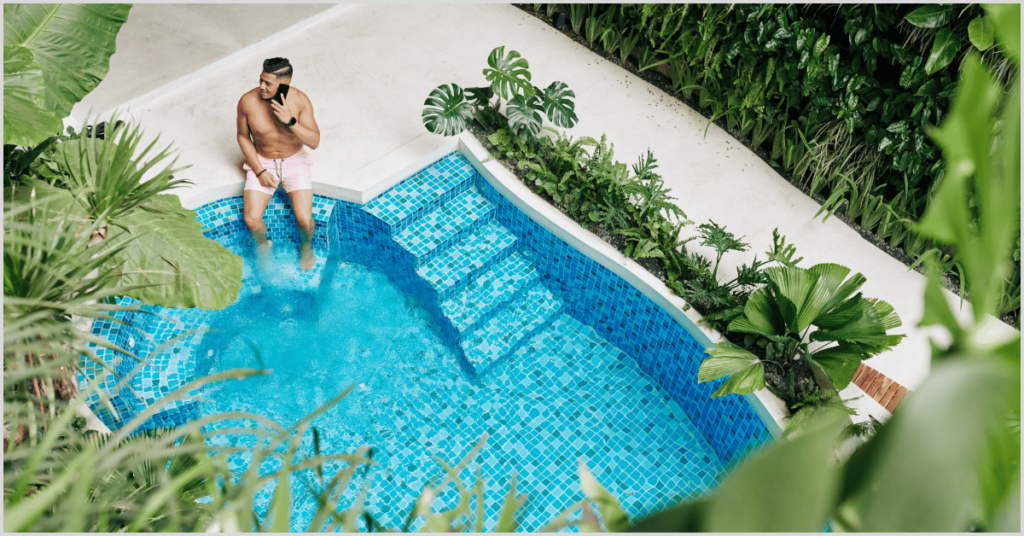
There is no better teacher than experience. When people sold their house with pool, they learnt the following:
- Sarah in Florida: “Our pool from the 1980s was faded. We spent $8,000 to fix up the surface and $500 to set it up with chairs from thrift stores. Held an open house by the pool, where kids played and adults relaxed. Sold in 12 days for $50,000 more than the asking price to a family looking for summer fun.”
- Mike from Ohio: “I ignored a small crack; the buyer’s inspection found it and demanded $10,000 off. Lost the deal. A quick check and a cheap fix could have saved us $500.”
- Lisa from Texas: “New buyers were worried about maintenance. We gave our service guy a $500 pool school lesson. They were afraid, but we were able to close in 18 days at full price.”
- Jen from California: “Our drone video of the pool at sunset went viral on Facebook groups in our area. Three bids in a week, each one $40,000 more than the last one. Images are important.”
These are not accidents; they are plans. Get ready early, stage smart, and sell bravely.
How to Deal With Common Buyer Concerns: 4 Scripts to Keep Deals Going
They will push back; that’s the game. If someone says they don’t want to buy a house with pool, here are four typical objections and how to handle them:
Objection 1: “Maintenance Costs Are a Budget-Killer”
Buyer Worry: $3,000 to $6,000 a year? That hurts.
Your Script: “I hear you. No one wants a money pit. Thanks to this energy-star pump, our records show that it only costs $1,200 a year. It costs $150 a month to hire a local pro, and I can put you in touch with them to get a free price. It’s like taking care of a nice lawn—not too hard, and worth it for the way of life.”
Flip: From fear to “doable perk.”
Objection 2: “I’m Worried About My Kids’ Safety”
Buyer Worry: Stats that show you’re drowning hit hard.
Your Script: “I totally understand your worry; our family felt the same way. So, we put up this self-latching fence and door alarms (show them off). Safety experts say they cut the risks by more than 80% and even dropped our insurance. You can feel the peace of mind.”
Flip: From danger to hero feature.
Objection 3: “The Pool Is Useless in the Winter”
Buyer Worry: Seasonal limits in places that aren’t warm.
Your Script: “Fair point if you’re somewhere colder. Costs stay at $300 a year, though, thanks to our sun cover and easy winterizing kit. You can go there alone in the summer. Also, you can use the deck as a fire pit all year—look at this set-up.”
Flip: From a yearly flop to an all-season winner.
Objection 4: “It Eats Up the Whole Garden”
Buyer Worry: There’s no room for pets or kids to play.
Your Script: “I hear you. Our dog also loves to run around here. Have you seen how we zoned it? The other part is for fetch (point it out). You could raise the fence or add a yard. Buyers love that they can swim or kick a ball; it’s up to them.”
Flip: From crowded to smart.
If you use these, complaints will melt away like ice in a cocktail by the pool.
How to Make Your Pool the Star of the Show in Marketing
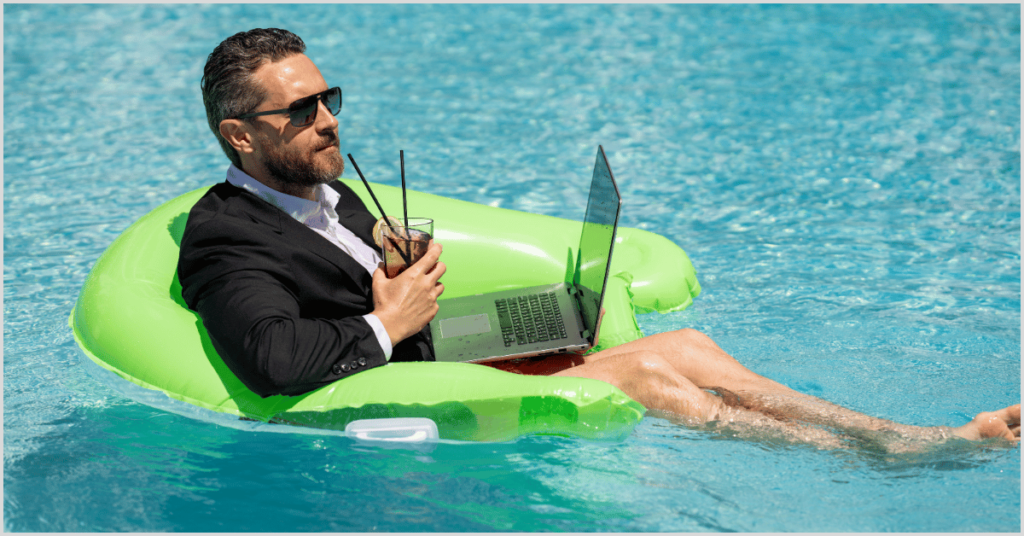
Your pool is only as good as people say it is. To sell a house with a pool in a sea of ads, the marketing needs to stand out and sell more than just the water.
- Visuals Matter: To get beautiful pictures at dusk, pay a professional shooter $300 to $500. The sound of water crashing in the golden light gives off a sense of wealth. Videos from $200 to $400 drones show size and layout. Virtual trips let buyers from far away “swim” online. A drone video of a Florida listing’s sunset went viral in the area, and the house got three offers in six days.
- Lifestyle Listings: They shouldn’t just say “pool.” Instead, they should say something like, “Dive into resort-style living with this heated in-ground oasis—perfect for family fun or fireside chats.” When you use buzzwords, they should make sense, like, “Stunning 4-bedroom house for sale with pool, ready for your summer memories.”
- Themed Open Houses: There should be a “Poolside Paradise Preview” with iced tea, supervised kid swims, and fact sheets on value-added features like care costs and safety features. This helped one agent get 30% more people to show up.
- Social Media Splash: Share reels of water moving to chill music on Instagram or in your local Facebook group. Ask people who are interested in families, “Do you want a house with pool? See this hidden gem on Saturday!” Pin related terms to get more attention.
- Incentives Seal Deals: To get people to sign a deal, offer a six-month pool cleaning contract for $700 to $1,500 or a $1,000 furniture allowance. Someone’s $500 gift safety cover made a buyer who wasn’t sure make a full-price deal.
Care for a Pool: What Buyers Need to Know
Buyers will question you about maintenance, so know what they’re talking about. The following steps will help you keep your pool clean and in its best shape:
- Daily Jobs: Remove solids, test pH, and add chemical substances (30 minutes, $15–$25 do-it-yourself; $60–$90 pro)—cost per year: $960 to $1,800.
- Utilities: Water and energy for pumps and heaters cost $700 to $3,000 a year. This is 50% less with solar heaters.
- Big Repairs: Pumps cost $700 to $4,000 every two to three years, plugs cost $1,200 to $3,800, and resurfacing costs $5,000 to $15,000 every seven to ten years.
- Insurance: Liability coverage for pools goes up by $200 to $500 per year. To see discounts, draw attention to safety measures.
This has to be written on a glossy reality sheet: “These energy-saving upgrades will assist you to revel in your pool for just $100 a month.” Being honest builds trust, and agreeing with close offers.
How Pool Buyers Think: Who’s Jumping In?
To sell a house with a pool, you need to know who you’re selling to. This person is likely to bite:
- Teenagers love pools for fun, and parents see them as places where people can hang out. Market as “your home for the summer.”
- Young Professionals and Entertainers want backyards that look good on Instagram. Draw attention to music systems or outdoor kitchens.
- Empty-Nesters: Luxury that doesn’t need much upkeep draws. Show off solar and easy-to-maintain features.
- Avoid: Retirees (they prefer neighborhood swimming pools) or parents of infants (they are frightened of safety). Adapt your open houses to the kind of client you need—kid-friendly for families, high-end for experts, etc.
An agent in Dallas said that 70% of the people who bought pool homes were families looking for “staycation vibes.” Know your audience and make your pitch.
Legal and Safety Issues: Making Sure You Cover All Your Bases
People who want to buy a pool will look at the rules. Check your local laws; many need four-sided fences, gates that close themselves, or warnings. Not following the rules can kill deals or lead to fines. As an example:
- Massachusetts: Requires that gates and walls be able to be locked.
- Florida: A lot of the time, storm zones need full enclosures.
- California: Requires drain caps that keep things from getting stuck.
Get a $100 to $200 pool safety check certificate to prove that you are following the rules. It gives buyers peace of mind and makes your ad stronger.
Last Waves: How to Make a Splashy Sale
When you sell a home with a pool, you’re not just offering a feature; you’re selling a way of life. From inspections to rewards, these 12 tips will help you sell your house with pool quickly and for a good price. Does having a pool increase home value? Yes, 5–15% of the time in the right market with the right prep. Is it harder to sell a house with a pool? Not if you stage your home well, sell it bravely, and work with an agent who knows how to work with pools.
Read more blog:
10 Glam Bedroom Ideas for Stunning and Beautiful Interiors
13 Farmhouse Interior Ideas that You’ll Love
Japandi Interior Design: 15 Ways to Style Your Home
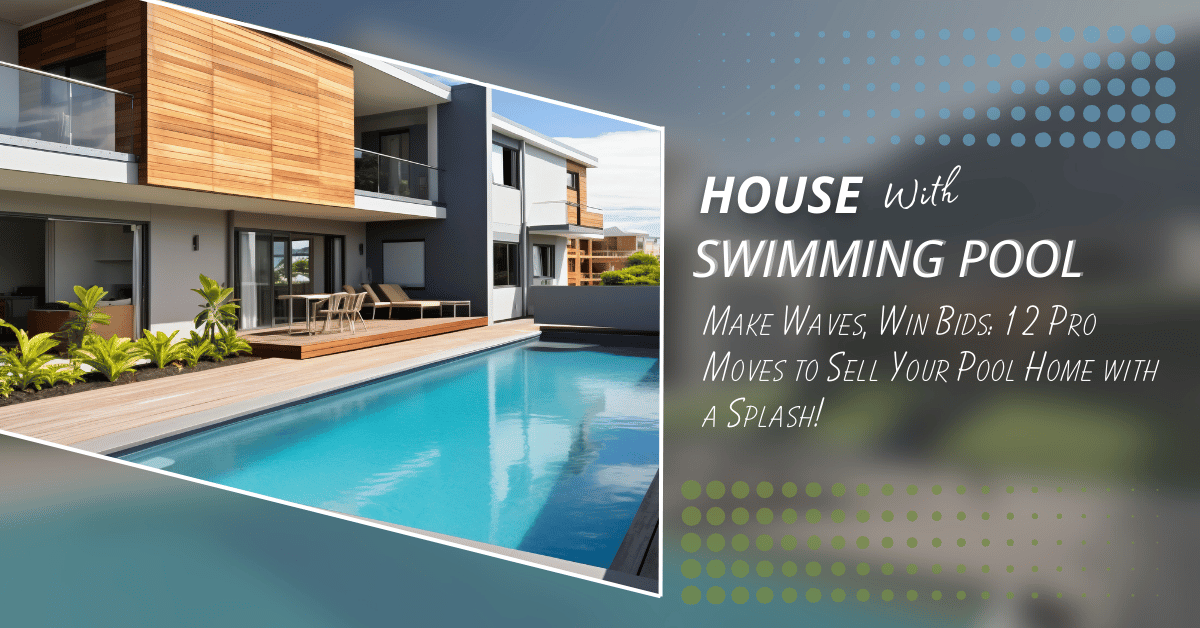
Your blog is a testament to your expertise and dedication to your craft. I’m constantly impressed by the depth of your knowledge and the clarity of your explanations. Keep up the amazing work!
Thanks I have recently been looking for info about this subject for a while and yours is the greatest I have discovered so far However what in regards to the bottom line Are you certain in regards to the supply
Simply wish to say your article is as amazing The clearness in your post is just nice and i could assume youre an expert on this subject Well with your permission let me to grab your feed to keep updated with forthcoming post Thanks a million and please carry on the gratifying work
[…] it also raises the risk. Before giving up any rights, talk to your agent and lawyer.Read more blogs12 Proven Tips for Selling a Home with a Pool Fast19 Open House Scripts to Close More Deals This […]